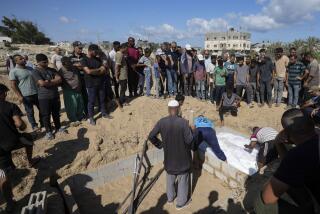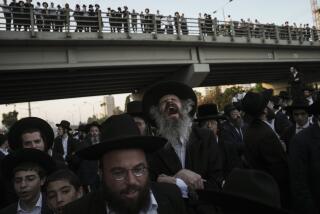Science, Religion Clash in Debate Over Graves
- Share via
JERUSALEM — The hand-lettered signs began appearing recently on the walls and community bulletin boards of this city’s ultra-Orthodox Jewish neighborhoods.
The fliers list the names and phone numbers of several prominent Israeli archeologists, including the head of Israel’s Antiquities Authority, and urge community members to harass and threaten the men, who are described as “grave robbers.”
The message ends with a chilling wish: “May their bones be ground into dust.”
An angry new front has been opened here in a timeless struggle between science and religion, pitting archeologists--who hope to document this land’s extraordinary history--against the faithful, who want to keep ancient burial sites intact.
Israel boasts about 20,000 archeological sites in a country roughly the size of Massachusetts. Ancient graves--Jewish, Christian, Muslim and pagan--are almost everywhere, sometimes on top of each other.
The debate over graves is not new in Israel, but with the inclusion of several small ultra-Orthodox parties in the governing coalition of Prime Minister Benjamin Netanyahu, the dynamics and tactics of the argument have changed. Some archeologists are worried that the religious parties will push out the secular head of the Antiquities Authority and establish greater religious supervision over excavations here.
“This has the potential to stop archeological digs in this country,” said Amihai Mazar, the chair of the archeology department at Jerusalem’s Hebrew University. “We can only hope it will not succeed.”
Rabbi Avraham Ravitz of the ultra-Orthodox United Torah Judaism party said he and other religious party leaders have urged Netanyahu to replace Amir Drori, the top official on archeological matters, because they believe that he is not sensitive enough to the concerns of the religious.
Drori, a tough-talking former general who has headed the authority for 10 years, says he will not resign and will fight any attempt to oust him. He has rallied support from archeologists and more than 20 members of parliament.
The religious leaders have also asked Netanyahu to appoint a committee, with religious representatives, to supervise the work at each dig, a daunting task in a country that averages 300 excavations a year.
“We are not against archeology work, but we don’t think it has to be done at any price,” Ravitz said. “When you find a cemetery or graves, you have to handle it with care, and with honor, and sometimes to leave it completely alone. The committee would make the rules and take into consideration the feelings of the religious people.”
Scholars say Jewish law is open to interpretation on the subject of graves, and some ultra-Orthodox community members support archeological research because it documents early Jewish history here. Others, however, argue that graves should never be moved and that excavations or construction must be stopped if they are discovered.
Drori and other top officials say the issue is purely political, a way for the religious parties to satisfy their more radical constituents. They say that, since a 1995 legal ruling, all human remains discovered during an excavation are immediately turned over to religious authorities for reburial.
“We follow this law very strictly,” said Gideon Avni, the Antiquities Authority’s chief archeologist for the Jerusalem area.
But Ravitz and others say they have their doubts.
“I have seen with my own eyes many times how they have desecrated graves,” said legislator Moshe Gafni. “They touch the bones and crumble them into dust, and this is shocking to any civilized man. . . . This situation is unbearable. It cannot continue.”
Batsheva Sobelman of The Times’ Jerusalem Bureau contributed to this report.
More to Read
Sign up for Essential California
The most important California stories and recommendations in your inbox every morning.
You may occasionally receive promotional content from the Los Angeles Times.










